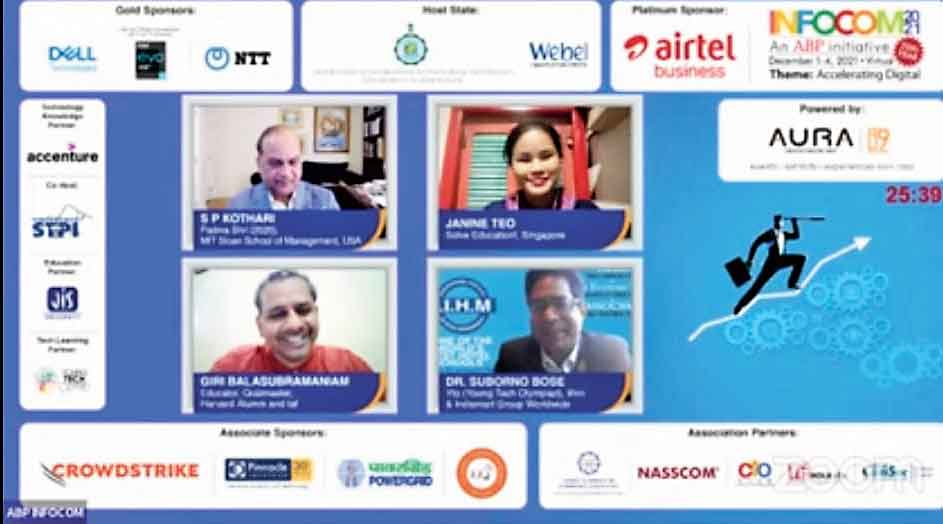The pandemic shook up education and underscored the need to skill people of all ages and make them employable instead of training the young to only chase degrees, said several speakers discussing “learning for life” at Infocom 2021.
An MIT professor, a CEO and an educator were the speakers at the spotlight session “Learning for life — Creating a better future” at Infocom 2021, an ABP initiative, on Thursday evening.
Suborno Bose, founder and chief mentor, IIHM, who moderated the hour-long session, flagged off the dramatic changes in education forced by Covid. “It taught us one important lesson and that lesson is that change is imperative. Covid pushed a lot of changes.”
The speakers took off from there and elaborated on the need to look beyond education as the world popularly knows it.
Excerpts from what they said:
S P Kothari, Padma Shri (2020), Gordon Y Billiard Professor of Accounting and Finance, MIT, Sloan School of Management
In all countries, but especially developing countries, a large fraction of the adult population is not well-educated. Naturally, this adversely affects their productivity and therefore income and the quality of life.
We cannot afford to ignore this population and in my opinion, that is where lifelong learning comes in. It’s applicable more broadly but it certainly can be targeted to this large segment of population that for whatever reason… has not enjoyed the benefits of education. So, for the benefit of this segment, as well as the welfare of a nation, focus ought to be also on adult learning.
We should be realistic and acknowledge that for this segment, vocational training type of adult learning has greater promise than traditional education offered to youth.
For the adult population — when they are focusing on getting educated, the opportunity that was deprived for whatever reason in their youthful days — the focus ought to be on vocational training and that can go a long way in enhancing productivity.
Janine Teo, CEO, Solve Education, Singapore
In the current scenario, not only in India but around the world, there is a high youth unemployment rate and this is because there is lack of focus on vocational schools…. Maybe the image of vocational training is not appealing to parents.
A lot of the education system has been doing demand-driven education. Demand is what the market demands and supply is what the education system produces. Many education systems actually produce a lot of youth having different degrees but not thinking what the market needs.
Therefore, how can we move from a supply-driven education to a demand-driven education? That is something that a lot of governments are thinking about.
Giri Balasubramaniam, educator, quizmaster, Harvard alumnus, and Indian Administrative Fellow, department of education, government of Karnataka
One of our big big challenges is to ensure that we do not have too much dropout rates from schools. That’s a huge challenge for us.
The pandemic has taken a toll on the people in the villages. The first easy decision for a family with an able child is to get the child to earn money and we need to stop that. So that’s quite honestly the first big challenge for most governments in countries like ours. It’s a problem for many countries.
Beyond that, it is to teach the elders. We sometimes do not spend enough time as a human race on reskilling and educating adults and that creates a lot of problems.…
You are going to be jobless far faster than you thought, you are going to be outdated far faster than you thought. You are going to live far longer than you thought. Those are amazing paradoxes, right.
